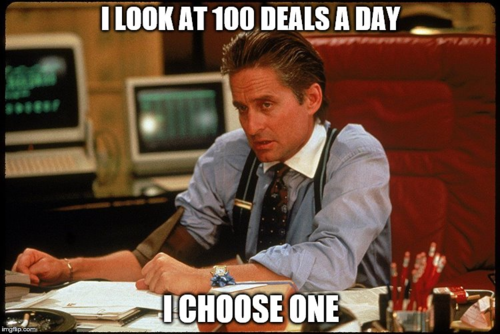Moosie
Grand poopa
A little history and then the question. (What is a company worth ?) I see there is a couple general topics on this but I figured I'd throw out more specific scenario with more accurate numbers).
I started a Camo Apparel business idea 3 years ago. Just an idea and not much thought behind it (Yah, typical me). Last summer I added Fishing Apparel because believe it or not, Camo didn't sell well in Summer Fishing apparel I think will. I had no money, which is par for me as well. I figured I'd need about $50k to start this idea. I thought that would be plenty. (I laugh at that idea now that I'm actually doing it). Had a few buddies tell me $250k-$350k min. When I got started I realized $50k was a drop in the bucket and I'd need $100k min. 3 different people offered me $50k for 50% of the companyon just the idea. Like most guys, I figured it would be worth more in short order and the owner always thinks it's a Million dollar idea, right ? So right or wrong I turned them all down. I thought, and still do, that if I could make it the first couple years that it would be worth a lot more.
Fishing apparel I think will. I had no money, which is par for me as well. I figured I'd need about $50k to start this idea. I thought that would be plenty. (I laugh at that idea now that I'm actually doing it). Had a few buddies tell me $250k-$350k min. When I got started I realized $50k was a drop in the bucket and I'd need $100k min. 3 different people offered me $50k for 50% of the companyon just the idea. Like most guys, I figured it would be worth more in short order and the owner always thinks it's a Million dollar idea, right ? So right or wrong I turned them all down. I thought, and still do, that if I could make it the first couple years that it would be worth a lot more.
I borrowed my own money, it quickly went from $50k to $100k to borrowing just over $200k. The first year with no real products and marketing there was no money made. The 2nd year I went to my first show season, hit the road and the Hunting Expos brought in more money and got me in front of people. Gross numbers did about $65k. this year, in 2nd years sales, we will do just over $100k. Despite Covid shutdowns. I should settle around $250k in sales a year. It won't be more unless I expand into stores and do the next level. Time will tell, it's only my 2nd yer of sales.
I don't really want to sell ownership of the company. I want my ideas, my pricing and my designs. That said, 9% interest on $200k eats into money. It's doable and I haven't had issues paying it but it slows down the growth and ideas. Maybe that's a good thing for a guy like me.
So now my question : If you put a Value to a company, whats your method ? I have $400k in sale value in product in the shop, this year I'll bring in $100k, only 2 years in Bizz. and just over $200k in debt.
A quick Value assessment to me would be assets minus debt, basic math.
I could use the 2 times Sales approach.
Thoughts ?
I started a Camo Apparel business idea 3 years ago. Just an idea and not much thought behind it (Yah, typical me). Last summer I added Fishing Apparel because believe it or not, Camo didn't sell well in Summer
I borrowed my own money, it quickly went from $50k to $100k to borrowing just over $200k. The first year with no real products and marketing there was no money made. The 2nd year I went to my first show season, hit the road and the Hunting Expos brought in more money and got me in front of people. Gross numbers did about $65k. this year, in 2nd years sales, we will do just over $100k. Despite Covid shutdowns. I should settle around $250k in sales a year. It won't be more unless I expand into stores and do the next level. Time will tell, it's only my 2nd yer of sales.
I don't really want to sell ownership of the company. I want my ideas, my pricing and my designs. That said, 9% interest on $200k eats into money. It's doable and I haven't had issues paying it but it slows down the growth and ideas. Maybe that's a good thing for a guy like me.
So now my question : If you put a Value to a company, whats your method ? I have $400k in sale value in product in the shop, this year I'll bring in $100k, only 2 years in Bizz. and just over $200k in debt.
A quick Value assessment to me would be assets minus debt, basic math.
I could use the 2 times Sales approach.
Thoughts ?
Last edited by a moderator:





